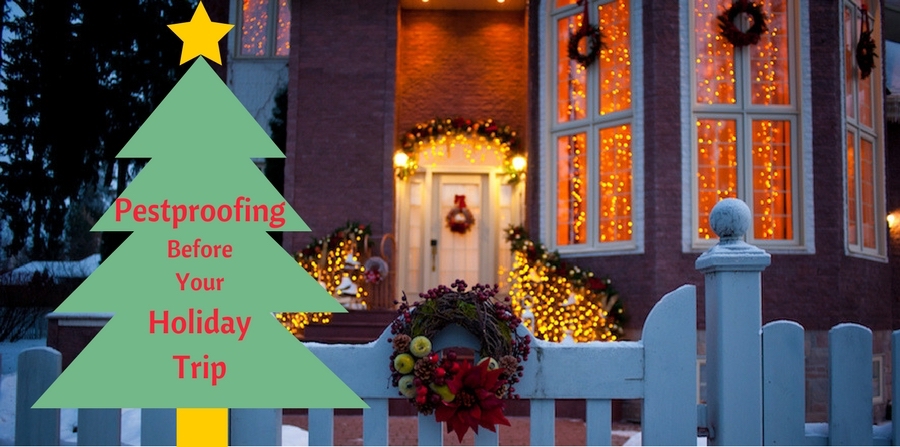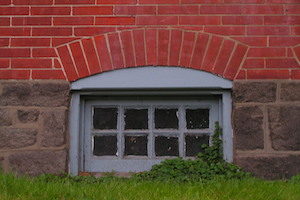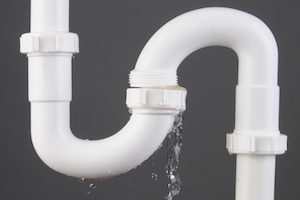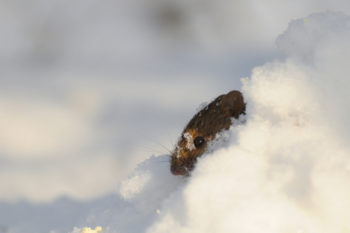
Getting away for the holidays is great! Getting ready to get away for the holidays is… not great. It’s hard not to stress out about leaving your home for any extended period of time. Worrying about gross bugs and rats getting in while you’re gone can’t help, either. Unfortunately, pests aren’t about to give you a break just because you’re busy.
A lot of pest infestations occur right before or during the holidays. Pests are kind of like Home Alone’s “wet bandits”; they’re just waiting for the right opportunity. Don’t give them that opportunity. Here are Griffin’s four best tips for winter pestproofing. Follow these instructions before you go on your trip, and even the most clever bug bandit won’t be able to get its grinch during the holidays.
Find Drafts
 Drafts happen when a gap in the wall of a home allows cold air to seep in. That cold air replaces warm air in the home by sucking it out the same gap where it got in. Pests feel this hot air from outside and follow it, hoping to find a place to keep warm. Mice are particularly good at finding and following drafts. Just about any gap wide enough to create a draft could be wide enough to let mice in.
Drafts happen when a gap in the wall of a home allows cold air to seep in. That cold air replaces warm air in the home by sucking it out the same gap where it got in. Pests feel this hot air from outside and follow it, hoping to find a place to keep warm. Mice are particularly good at finding and following drafts. Just about any gap wide enough to create a draft could be wide enough to let mice in.
Most drafts happen around doors and windows, or in basements and attics. Inside the home, drafts feel like cold areas in otherwise warm rooms. If the problem is bad enough, you may even be able to hear the “whoosh” of air escaping. Drafts may also cause visible or measurable humidity problems. Seal the gaps that create drafts with caulk and/or insulation material where applicable.
Fix Leaks
 All living creatures need water to live, even overwintering pests. Moisture and humidity attracts pests almost as much as the promise of warmth. Little insects don’t require much water to get by, so even a small plumbing leak works just fine. Pests find the moisture they need by sensing air humidity or smelling loose moisture. Even small plumbing leaks can drive up a home’s humidity enough to attract pests.
All living creatures need water to live, even overwintering pests. Moisture and humidity attracts pests almost as much as the promise of warmth. Little insects don’t require much water to get by, so even a small plumbing leak works just fine. Pests find the moisture they need by sensing air humidity or smelling loose moisture. Even small plumbing leaks can drive up a home’s humidity enough to attract pests.
Don’t assume you don’t have any plumbing leaks. Dripping faucets, hairline fractures, and other minor problems are hard to notice, but pests will find them. Even “invisible leaks” can attract pests if they’re leaking water into the walls or ceiling. You can use your water meter’s “leak indicator” to figure out if your home has a leak. This indicator moves to tell you when water is flowing through your pipes. If it’s moving when your home’s water is turned off, you probably have a leak.
Store Food
 Food attracts pests just as reliably in winter as it does the rest of the year. Cereals, bread, and other grains are particularly attractive to pests. Some pests, like rodents or boxelders, are content to simply munch on food through winter. Others, like pantry moths, might infest your food and even lay eggs in it. You don’t want to come home to a pantry moth infestation.
Food attracts pests just as reliably in winter as it does the rest of the year. Cereals, bread, and other grains are particularly attractive to pests. Some pests, like rodents or boxelders, are content to simply munch on food through winter. Others, like pantry moths, might infest your food and even lay eggs in it. You don’t want to come home to a pantry moth infestation.
Start by disposing of any food that’ll go bad while you’re away. Put food you’re throwing away in airtight plastic bags, and take it to your outdoor dumpster directly. Have a neighbor put out your garbage, so leftover food doesn’t sit around in your dumpster for weeks. Store any food you’re keeping in your house in airtight, hard plastic containers. Finally, clean up the kitchen and dining room right before you leave, so you don’t leave crumbs behind.
Seal Entryways
 We started talking about this during the draft section, but it bears repeating. Entryways like doors and windows are the number one way pests get into homes. Tiny gaps naturally develop near doors and windows in several ways. The elements wear away at thresholds and weatherstripping. Continual use may warp or damage joints, housing, or moving parts. Some pests even work away at sealing surrounding thresholds themselves.
We started talking about this during the draft section, but it bears repeating. Entryways like doors and windows are the number one way pests get into homes. Tiny gaps naturally develop near doors and windows in several ways. The elements wear away at thresholds and weatherstripping. Continual use may warp or damage joints, housing, or moving parts. Some pests even work away at sealing surrounding thresholds themselves.
Weatherstripping on doors and windows is sturdy, but it also wears away quickly. You should consider re-stripping each door and window in your home seasonally. While you’re at it, make sure doors and windows sit properly in their frames. If you can see light peeking through corners, you should reinstall the fixture. Seal any gaps you find in thresholds with caulk. If your older windows look worn down or don’t fit their frames properly, consider having them replaced.
Even if you’re busier than ever during the holidays, taking time to pestproof your home before a trip is worth it. Following these four steps doesn’t take long at all, and they’ll buy you some much-needed peace of mind while you’re away.
Speaking of peace of mind, remember: even if you end up with a pest infestation this winter, don’t panic. Just call Griffin Pest Control and we’ll take care of it quickly, effectively, and permanently. You’ve got enough to worry about this time of year, so let us sweat the small stuff. Happy Holidays!





